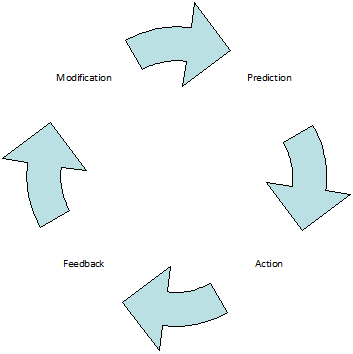II.1. Constructivist learning theory
Constructivism is a theory of knowledge that investigates the roots and development of knowledge. In contrast with former learning theories it argues for assigning an active, constructive role to knowledge. Constructivism also believes in the personalized structure of knowledge.
’Everything we know is knowledge we have constructed in ourselves for ourselves. People build their own world in themselves within the framework of their social relations. What we know is not identical with the real world and, it is not a mirror-image of the world either. Instead, it is our model, our personal interpretation of the world.’ (Nahalka, 2002, 11.)
It can be concluded from the above statements that according to the basic principle of constructivism the source of our knowledge is not an external one, it is not something that simply accumulates in learners, but it is actively constructed by them. In this learning process the knowledge learners already have, with other words their previous ideas and experience, all play a very important role. Previous knowledge is a whole system in the mind. Learning is rooted in people’s social activities and, thus, social processes and relations play a role how we contruct our understanding of the world and our assessment of our own knowledge. Our experiences are also construed and the way how we process information plays a very significant role in it. Experiences appear as notions, ideas, visual pictures of the mind, elements, which are all parts of our cognitive system. In the next passages our teaching material is going to explain how constructivism interprets the acquisition process.
Learning theories that dominated pedagogy prior to constructivism pointed out that the source of knowledge by them was an external source, to be found ’out there’ in objective reality. Further, they also explained that learners acquire knowledge with the help of some kind of a mediatory mechanism. Constructivism disagrees with the idea that knowledge is the simple mirror-image of the world and also disapproves of the idea that such process exists at all. In constructivists’ view knowledge is a holistic notion, which describes a very complex system and relates to the entire cognitive system. During the learning process our knowledge does not simply grow by adding new elements to it, but these new components would change the connectivity system (connectivity pattern) in the formerly acquired knowledge. Consequently, the most important feature of constructivism is that, instead of a kind of cumulative growth it develops by constant modification of the structure of the cognitive system. Adaptivity represents the most important part of the cognitive process. Adaptivity develops as a result of subjective decision, meaning, that it is the learner who determines whether or not an element is adaptable or not adaptable for his or her store for knowledge. The learner participates in this process as a social being meaning, that he would consider the effects of his decisions on the social space.
As it was mentioned earlier, according to constructivist theory, knowledge is not gained through a process of mediation, but it is rather construed by the people themselves. According to the interpretation of constructivists, cognition is an active, what is more, a constructive process, during which people do not store knowledge, but construct them instead. Constructing knowledge comprises interpretative processes meaning, that the learners’ minds process information using the knowledge they already have, attempt to insert the new information into the old system and this is how they attempt to construct new knowledge. Consequently, all our thoughts and all our actions are driven by the system of knowledge we already have. It is assumed that this is the reason why it takes some time to adopt (accept) new theories.
Processing information means the mobilization of cognitive structures; each new piece of information is evaluated on the basis of the already acquired knowledge; this is why the process is more complicated than simple inductive knowledge acquisition. Instead, it can be described as a process of deduction. The human mind has predictions, schemes concerning the phenomena as well as the processes in the world and uses them during the process of knowledge acquisition. Our actions, our reactions to new information and our problemsolving activities are all based on these predictions and schemes. In our thinking we consider to what extent the predictions may come true and we modify those if our experiences compel us to do so.

The cycle of human thinking and actions
This process of cyclical nature makes it possible for us to regulate our thinking and actions. Our view of the world plays a very important role in this process, since it allows predictions to have an impact on our thinking. First the processes are ’acted out’ in our minds with the help of the naive ideas or scientific theories which make up our world view, then we act according to the expected results. The starting point, the most decisive part of this cycle is our knowledge of the world, i.e. the model of the world that can be found in our heads. In cognitive sciences anything can be true in relation to human actions, problem solving and the regulation of thinking. In view of the above it can be stated that the learning process is not inductive, its starting point is not the ’empiria’, that is experience, but a world model, which comes into being as a result of very complex developmental processes. Constructivism does not deny the significance of experience (empiria), but in constructivist theory, although experience is an important part of knowledge acquisition, it cannot be considered as its starting point.